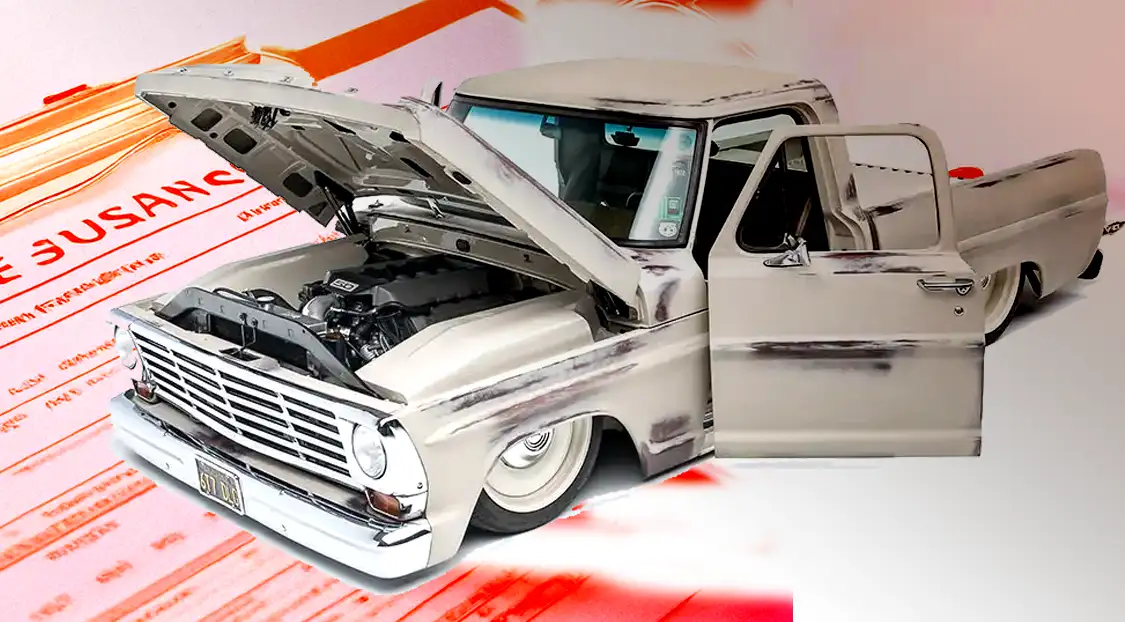 STREET TRUCKS STAFF
.
May 28, 2025
.
Industry News
.
STREET TRUCKS STAFF
.
May 28, 2025
.
Industry News
.

Building a custom truck takes time, money, and real effort. Once it’s on the road, what you’ve added—or removed—can affect more than just how it looks or drives. Your insurance company may see those changes differently than you do, especially if something goes wrong.
A modified truck doesn’t always fit neatly into standard policy boxes. What you drive, how you describe it, and how it behaves under pressure can all affect how a claim gets handled after a crash. The rules aren’t always obvious, and what you don’t tell your insurance carrier might cost you more than just higher premiums.
Most insurers are comfortable with daily drivers. They’re built to factory specs, tested for safety, and easy to repair. Modded trucks are a different story. They can stop differently, steer differently, and sometimes behave unpredictably in an emergency. That doesn’t mean they’re dangerous—it means they’re harder to evaluate.
Insurers are risk managers. When something about your vehicle changes how it handles, accelerates, or stops, they want to know. What they’re looking for is whether your modifications increase their exposure. That starts with one simple question.
If you added performance upgrades, removed factory safety features, or changed your suspension geometry, your carrier probably wants to know. Some companies require you to list major modifications when the policy is written or renewed. Others ask only after a claim is filed and that’s where things get tricky.
When a claim is submitted, an adjuster might review the vehicle in person or through photos. If the truck looks different from the one they insured, they can use that to reduce or deny payment. Worse, they may cancel your policy entirely and leave you needing new coverage before you can legally drive the truck again.
Even if the mods didn’t cause the crash, their presence could impact how much damage is covered or whether they’re included at all.
Every insurer has different policies, but most of them review three key areas.
Is the truck a daily driver, a weekend toy, or a trailer queen? How often it’s on the road affects how they rate your risk. They’ll also look at how the truck performs in traffic. If the ride height, power curve, or steering response affects control, they may flag that.
If your modifications were done by a professional shop, keep those receipts. If you did the work yourself, be ready to answer questions. Insurance adjusters want to know that your upgrades weren’t just bolted on—they were done right.
They may also ask for proof that the parts you installed were designed for road use, not track-only applications. If your install caused the failure, the damage might not be covered.
Laws vary by state, but some safety components are non-negotiable. Tinted headlights, non-DOT tires, or deleted airbags may violate road equipment laws. If you crash in a truck that breaks those rules, the investigation could turn against you quickly.
Not every mod raises a red flag. But these tend to show up in claim disputes more than others.
Insurers may question whether the increased output contributed to a crash—or made it worse.
Mods like this can change how the truck turns, stops, or keeps traction, especially when something unexpected happens in traffic.
Some changes go beyond appearance. They affect how the truck protects you in a crash.
If another driver couldn’t see your signals—or if poor lighting contributed to a collision—you could be assigned more fault, even if you weren’t doing anything wrong.
If your carrier finds out about your modifications after a crash, it can cause real problems. Some will deny the claim entirely. Others may reduce the payout to match what the truck would have been worth unmodified. And if you’re held at fault, the situation gets more serious.
Insurers don’t need to prove that your mods caused the crash. They only need to show that you failed to disclose something material to the policy. That’s enough to deny coverage.
If someone else is hurt, you may be sued personally. A truck accident lawsuit can open you up to costs your insurance would’ve covered—if your truck had been properly listed and evaluated.
A rear bag fails at 60 miles per hour and causes the truck to drag and lose stability. No one’s hurt, but the carrier finds out the suspension system wasn’t disclosed. The claim is denied, and the driver is stuck paying out of pocket for the damage.
The taillights are shaved, and the brake lights are relocated but dim. Another driver rear-ends the truck but argues they never saw the brake lights. The insurer assigns shared fault, and the payout is reduced.
A truck gets a supercharger but no brake upgrade. The increased speed leads to rear-ending a stopped car. The adjuster claims the mod contributed to the crash and denies the claim on that basis.
Here’s how to make sure your modified truck is properly protected.
Don’t wait for a crash to find out where you stand. Call your agent, review your policy, and ask how modifications affect your coverage. You might face a rate increase or even a re-underwriting process—but that’s better than facing a denied claim later.
Be honest about what you’ve changed. If your truck isn’t legal for road use, that’s worth fixing now—not after someone else’s car is damaged.
If you’re in an accident, keep your comments short and focused. Don’t explain your build at the scene. Don’t volunteer technical details to the other driver. And don’t speculate about what might have failed.
Talk to your insurance company calmly and stick to the facts. If someone is injured or starts asking about your truck’s modifications, you may want legal guidance from someone who understands how fault is assigned after a crash involving a custom build.
You don’t have to stop modifying trucks. Just be honest about what you’ve changed and how you use it. Insurance doesn’t cover what it doesn’t know about, and no carrier wants to pay out for a vehicle they didn’t agree to insure.
The minute your build touches public pavement, you’re not just a builder—you’re a driver with legal responsibility. If something fails or causes harm, it’s your name on the paperwork.
If your mods affect how the truck performs in traffic, they affect your liability. That’s not a problem if you’re upfront about it. But it becomes one fast if you’re not.
Disclaimer: This article is for informational purposes only and does not substitute for legal or insurance advice. Contact a qualified professional if you have questions about accident liability or insurance coverage.
Share Link